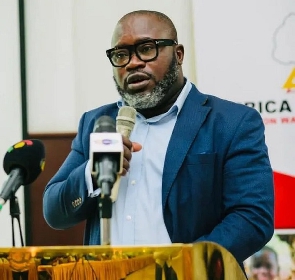 Kofi Asare is the Executive Director of EduWatch
Kofi Asare is the Executive Director of EduWatch
Stakeholders in the education sector have decried the “worrying” reduction in the 2023 budgetary allocation for basic schools in Ghana due to the pending International Monetary Fund (IMF) assistance programme.
They say education should not be a target for expenditure cut as the country embarks on the IMF programme, and have thus called on the government to leverage the supplementary budget for 2023 to improve basic education in the country.
The government for the first time in 20 years, reduced the percentage of the national budget for education under the medium-term budget and expenditure framework (2023-2025) to 12.9 per cent in 2023.
A reduction of 11.1 per cent is expected in 2025.
Those figures are below the United Nations Educational, Scientific and Cultural Organisation (UNESCO) minimum benchmark of 15 per cent. Also, three per cent of the Gross Domestic Product (GDP) was allocated to education instead of UNESCO’s suggested four per cent minimum.
Concerned about the development, which they attributed to an IMF-induced 2023 budget, the stakeholders called on the government to use the supplementary budget for 2023 to improve basic education financing.
They made the call at a forum in Accra on Thursday to discuss the implication of the IMF programme on Ghana’s basic education.
The forum was organised by Africa Education Watch (AEW), with support from Oxfam – a global organization that fights inequality to end poverty and injustice.
Speaking at the forum, Mr Kofi Asare, Executive Director of the AEW, said since a cap was put on the Ghana Education Trust Fund (GETFund) in 2017, about GHc 3.7 million had been lost from the education sector to other sectors of the economy.
He said the implication was that GETFund would not be able to create the fiscal space to absorb the estimated one million out-of-school children and provide the infrastructure for the over 5,000 schools under trees and sheds.
Mr Asare pointed out that with the freeze on public sector employment in the 2023 budget and going by the 2021 teacher attrition of 8,209, there would be a teacher deficit of about 7,000, which would also be detrimental to quality education.
“Austerity periods including IMF’s medium-term programme are occasioned by increased taxation, affecting the poor negatively, hence, the need to cushion them with programmes like school feeding,” Mr Asare suggested.
Mr. Abdulkarim Mohammed, Coordinator of the Economic Governance Platform, bemoaned the government’s decision to reduce spending on social services, pointing out that it would have adverse effects on basic education.
“A cut in expenditure for education under an IMF programme portends a drawback on the gains made in basic education including quality education, human capital development and economic growth,” he said.
He urged CSOs to engage the Ghana country office of the IMF and target some countries on the IMF Board to make proposals on the need to safeguard social services, especially education.
Mr Alex Ampaabeng, a Fiscal Policy Analyst with Oxfam, urged the government to lower the cost of governance by consolidating some ministries and cutting down on the number of ministers to reduce public spending.
Suggested ministries for mergers included Food and Agriculture/Fisheries and Aquaculture Development, Information/Communication, Energy/Science Technology, and Innovation.
“Education should not be a target for expenditure cut as the Government embarks on this IMF programme. The government should dedicate a percentage of revenue to rural education infrastructure development, just as it was done with the rural electrification project,” he encouraged.
Groups present at the forum included the Conference of Heads of Basic Schools (COBS), Conference of Heads of Assisted Secondary Schools (CHASS), Ghana National Association of Teachers (GNAT), National Association of Graduate Teachers (NAGRAT), the National Union of Students (NUGS), Civil Society Organisations (CSOs), as well as policy activists.